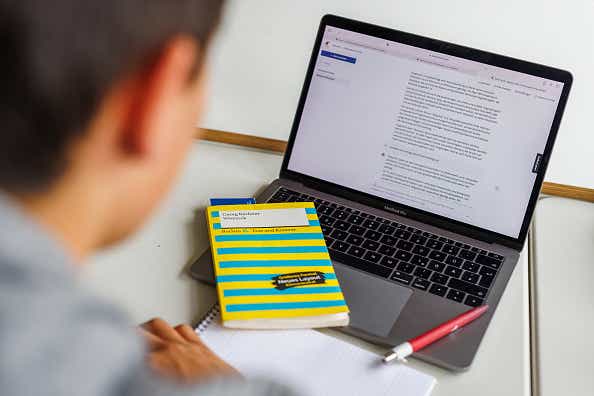AI stands for Artificial Intelligence. It refers to the development of computer systems that can perform tasks that would typically require human intelligence, such as speech recognition, problem-solving, and decision-making.
Now, before we go any further, those two previous sentences were written by Snapchat’s AI Chatbot. Could you tell? Probably not, which is exactly why this software might become pretty harmful to our school systems — and to young learners everywhere.
ChatGPT makes plagiarism much too tempting.
Launched on November 30, 2022 and created by Open AI, Chat Generative Pre-trained Transformer, or ChatGPT, has become an efficient way for students to complete assignments with minimal effort. All students have to do is ask the AI a question, and it responds with an answer. But ChatGPT is different from search engines like Google, because it can write anything — from an essay on climate change to a book report about Homer’s The Odyssey.
As the academic year begins, educators around the country are creating their curriculums, reviewing their assessment schedules, and crafting their reading lists. And now principals or headmasters are also revising their Code of Academic Integrity, thanks to ChatGPT. While this technology rapidly advances, students and educators alike are wondering what role AI will play in schools.
ChatGPT makes plagiarism much too tempting, thanks to the way it puts detailed fast facts at a student’s fingertips. As a high school student who’s constantly stressed out during the academic year, I understand the appeal: Why spend time writing a four-page paper when AI can do it instead? (Especially when you have five other assignments to finish, and three other tests to study for simultaneously.) Will the use of ChatGPT limit students’ creativity and ability for critical thinking, though? I spoke with educators at four different schools who agreed on one thing: Artificial intelligence is a powerful tool that has the ability to transform education — in positive and negative ways. As LaGuardia High School acting teacher Lee Lobenhofer says, “AI allows for spewing back information and even producing papers, but not with a creative touch of inspiration.”
AI has the capacity to change the way that the educational system functions — and the way students study. I spoke to one, a recent graduate of Indiana University's Kelley School of Business, who says he used ChatGPT on multiple occasions for his schoolwork. He asked it to compile research and generate outlines, saying, “It’s an amazing tool to use when writing an essay and doing research — it even helps with composing emails.” (Most of his professors weren’t sure if they should ban or incorporate the tool into their curriculum, so instead, they just gave students subtle hints to not use it for their papers.)
Yes, ChatGPT makes research more efficient by offering up detailed answers to any question in a matter of seconds. But can using it beyond that scope compromise a student’s originality?
Evelyn, a high school student at a private school in New York City, says she’s never used AI or ChatGPT, and also worries it might affect her creative output. In her Python class at school, many of her classmates use it: She says they ask the AI bot to write the computer programming code for a certain game, and it spits back a working code. But Evelyn has vowed to never use it in that class or in English class. “I have a specific writing voice, so it would be really detectable,” she explains. “I also enjoy writing, so I haven’t even opened ChatGPT, because if I get away with using it once, I’ll want to use it again.”

Schools are aiming to get ahead of the possible negative consequences of ChatGPT. Daniel Feigin, the Head of School at Trevor Day School, has had open conversations with his faculty about artificial intelligence and believes that the use of AI may be impossible to ban or supervise. So for now, he’s focused on communicating with the students on the school’s policies, and finding a way to use the software as a valuable resource. (At Trevor Day School, AI can’t be used for an assignment without a teacher’s instruction; the school classifies other uses as plagiarism.)
Teachers are becoming so anxious about the use of AI that it’s potentially doing damage to student’s reputations, whether they employ it or not. A graduate from the University of Michigan said her boyfriend’s brother was accused of using AI to write his paper, because it was so well-written. “Thankfully he disputed the accusations by showing proof of his initial brainstorming and the first few drafts of the paper,” she says. “He earned an A on the paper and the professor apologized profusely.”
One student at the University of Wisconsin-Madison says he uses ChatGPT to research and brainstorm ideas, but says it can often provide incorrect information. “I think ChatGPT is definitely a shortcut, considering it uses the internet similar to Google or another search engine,” he says. “But it refines the search results into a more specific answer than Google does. There’s nothing wrong with using AI to help gather ideas and inspiration, as long as you aren’t using it to write your whole essay.”
Although the use of AI in schools is a relatively new phenomenon, one administrator from a K-12 school in D.C. says the emergence of tech isn’t necessarily a brand-new topic for educators. “Just as we had to figure out how the calculator affected math instruction, the internet changed research, translation sites altered language teaching, and tools like spellcheck and Grammarly impacted writing," he says, "we now need to apply the same rigor to tackling newer AI, like ChatGPT, that has such potent application, both for good and bad.” Schools are working diligently to tackle this new technology, and, as he explains, “There will definitely be bumps and uncertainty as we go.”
Schools can announce policies concerning AI all they want, but when students complete their assignments alone, it can be nearly impossible to monitor which websites they’re using — and to punish anyone who breaks those rules. ChatGPT is requiring educators to go on the offensive, and essentially alter the way they teach. Lobenhofer says “Teachers are needing to rethink assignments, and focus more on creativity and less on regurgitation,” to prevent the impermissible use of AI.
Haven't used ChatGPT yet? Set up an account here and start giving it some sample requests, like "Send an apology email to a friend," or "Summarize the plot of The Old Man and the Sea in 600 words."
Despite the potential negative effects of ChatGPT on education, some schools are working to implement it into their curriculum, since they’re unable to control its spread. Dr. Tom Kelly, the Head of School at Horace Mann School, says he’s “looking forward to individual disciplines allocating time to exploring the possibility of AI being used as an appropriate teaching tool.” And Lobenhofer believes that students will be able to embrace their creativity through AI — if schools learn how to appropriately add it to their educational plans. With the technology advancing so rapidly, though, many schools may not understand how to best incorporate AI into studies. The best of both worlds would be students doing research via AI, interpreting the data, and writing their work themselves. But is that realistic in an increasingly high-pressured academic world, with many students saddled with hours of homework a night?
Will students start using AI to improve their work, or to complete it entirely? Will “ChattingGPT” or “ChatGPT-ing” eventually become a verb like Googling and Xeroxing? (The phrase “I’m going to ChatGPT that” seems likely to enter our lexicon.) Only time will tell how complex and advanced artificial intelligence will become, but ChatGPT isn’t going away anytime soon. And it remains to be seen how it'll be used, whether in the hands of a tech-savvy worker — or a busy teenager in the classroom.
Sophia Paley is a New Yorker and a senior at the Horace Mann School.









